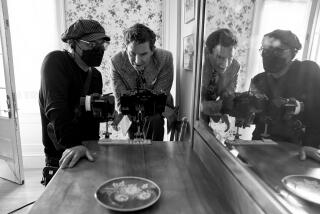A 40-Year-Old Absurdist Joke Is Still Finding Its Mark
- Share via
The heyday of absurdist theater may have passed, but artists keep the torch burning. Citing the then-new plays of Samuel Beckett and Eugene Ionesco, critic Harold Clurman once identified a need we seem to have for figuring out “crazy plays.”
Today, “crazy” seems a quaint way of describing Ionesco’s brand of absurdist drama. What was once crazy is now familiar. But, as director Florinel Fatulescu demonstrates in a new production of Ionesco’s 1957 play “The Chairs” at the Stages Theatre Center in Hollywood, the dualities that so tickled Ionesco still sprout mystery.
The characters are Old Man (Jeremy Lawrence) and Old Woman (Barbara Bain), living fondly together at the end of their days. Their age is theoretical; though given to nostalgia, they display a spry energy and a neediness that is perfectly vital.
In one of the several smart liberties Fatulescu takes, two nooses wait on either side of the stage, their unremarked presence silently pushing the action forward. A little girl’s weird lullaby hauntingly written by Rodica Fatulescu, the director’s wife, adds atmosphere as well.
The Old Man and Old Woman engage in a falsely merry dance of assurance and reassurance, spoken in the shorthand that mutual dependency thrives upon. They talk more for the sake of comfort and complaint than for actual communication. They recall pivotal events--such as whether they had a son or not--completely differently, yet they never disagree. They continue to strive for an importance they don’t believe they have. They endow each other with titles that echo their emptiness back at them--he is called General Factotum; she is Semiramis, after the Babylonian queen.
Their private dance becomes public, as they begin to receive a series of invisible guests. Semiramis hurriedly carts out chairs until the stage is filled with them. As they react to the people on these chairs, a comic pulse springs up between the way they hope they are perceived and the more ridiculous way we perceive them, between their social gaffes and their social ambitions. To Ionesco, life was a cruel joke, but it was a funny one.
Dressed coquettishly in layers of slips and bloomers, Bain melds the vaudevillian and tragedian in her character. Her kittenish manner collides implacably with an unblinking, reptilian stare. She seems to know much more about the mercilessness of life than she lets on.
*
Lawrence is quite wonderful as Old Man. He has a kind and rubber face, expressive, vulnerable and reminiscent of great comedians like Jack Gilford and Bert Lahr. His frantic need for approval drives the action.
The two await the coming of the Orator, a personage, a speaker who will be able to tell others about their lives and give their lives the meaning they dare to hope it has. Fatulescu again departs from the text to great effect here, providing a complacent and vain matinee idol (Mitchel Young Evans) from the vague movie past.
For this character, the director chooses an amalgam of cultural styles rather than one particular stereotype, which plays brilliantly. Sporting a thin, Errol Flynn mustache and a zoot suit, the Orator models his profile until it is time to begin speaking.
The baby-talk gibberish he spouts is Ionesco’s final joke, an unanswerable observation on our attempts to find constant meaning in everything we do. More funny than cruel, the joke is made gently, with a feeling of regard for the poor species that suffers from such delusions of grandeur.
* “The Chairs,” Stages Theatre Center, 1540 N. McCadden Place, Fridays-Saturdays, 8 p.m.; Sundays, 3 p.m. Ends April 6. $18. (213) 465-1010. Running time: 1 hour, 20 minutes.
More to Read
The biggest entertainment stories
Get our big stories about Hollywood, film, television, music, arts, culture and more right in your inbox as soon as they publish.
You may occasionally receive promotional content from the Los Angeles Times.










